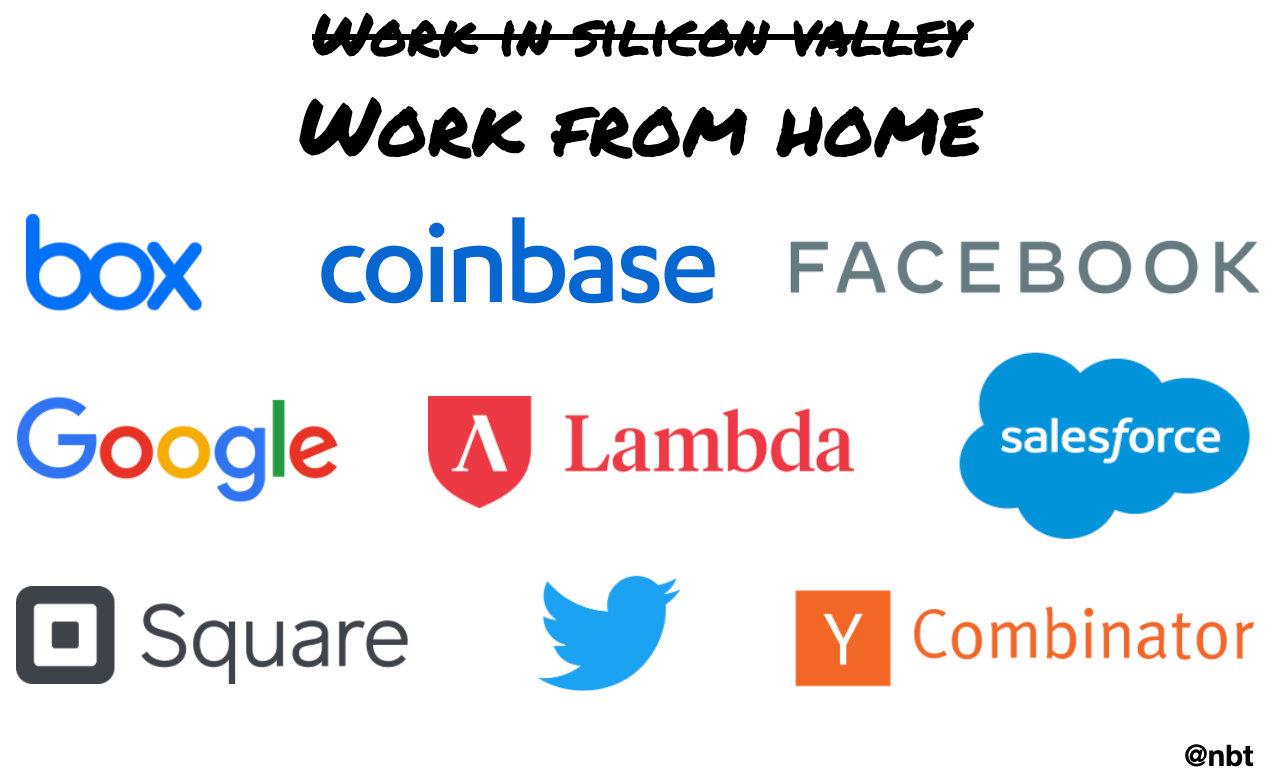Welcome to issue #4 of next big thing.
Where will be the next Silicon Valley? is a timeless question.
But the reality, accelerated by the current work from home era, is that no geographic location will be the next Silicon Valley.
Instead, Silicon Valley's culture and mindset is increasingly found everywhere.
Office Centricity is Over
It's been a historic few weeks.
Box, Coinbase, Facebook*, Google*, Lambda School, Salesforce*, Shopify*, Spotify*, Square, and Twitter* are just some of the technology companies that have announced extended or permanent work from home (WFH) policies. "Office centricity is over" declared Tobi Lütke, Shopify's CEO.
Permanent WFH is a very hard policy to reverse. A company would either have to force those employees to move to a location with an office, or let go of the remote workforce. The seeming irreversibility is why these decisions feel historic to me.
More companies will surely follow suit, for two key reasons.
First, WFH enables companies to reduce costs and save money. My friend Om Malik wrote a great piece on this: "it is always about the money."
Second, WFH can be a competitive advantage in attracting the best talent. Lütke pointed this out in his announcement:


The talented engineer in Bozeman or Bucharest can work for any company that enables WFH. And any Silicon Valley-based employee of a WFH company could move to either of those cities, or anywhere else.
This final point got me thinking about the age-old question: where will be the next Silicon Valley?
The Silicon Valley Mindset
When I moved from the UK to the San Francisco Bay Area in 2002, as a 13-year-old, I didn't know much about technology, but I could feel that there was something special about the place people called Silicon Valley.
The first technology office I visited here was that of Sun Microsystems, where my father worked, which is now the Facebook HQ in Menlo Park. I remember marveling at the open layout, the colorful walls, and the campus feeling. It was unlike any preconceived notion of an office that I had in my mind.
You had to physically see Silicon Valley to get it back then. You had to be here to learn about the stories of the companies that had been built here. You had to meet people at their offices (or at famed eateries) to hear those stories. There were few examples of big technology companies that had been built outside the Valley.
All of that has changed in the last couple decades.
Silicon Valley's companies have offices in many countries, and Silicon Valley-style offices exist around the world. There are so many books, essays, newsletters, podcasts, resources, tweets, and videos to learn about companies here and how they've been built. You can meet people virtually, work remotely, and no one is meeting in person anyway right now.
While the concentration of large and growing technology companies is highest in Silicon Valley, there are now four public tech companies in New York City valued at ~$10B or more (Datadog, Peloton, MongoDB, Etsy). Shopify, Spotify and many others have built very large public tech companies outside the U.S., and there are fast-growing companies such as Automattic, GitLab, InVision, and Zapier that are fully distributed, with no offices at all.
These companies have all learned from Silicon Valley, adopted the best practices pioneered here, and forked them for their own success.
That's why it's wrong to think of Silicon Valley as a geographic location today. Instead, Silicon Valley is a mindset, a culture by which startups get built, and it has permeated through every startup wall in the world.
I felt this acutely on my most recent visit to an office outside the U.S. — when, in January, I visited the founders of Canva*, a design software company most recently valued at $3.2B, at their HQ in Sydney, Australia. As I smashed an avocado onto a piece of toast for breakfast in the colorful communal dining room, I could have been in San Francisco, or, frankly, anywhere.
Adapting to EFH
So much has changed in the world since my visit to the Canva office four months ago, catalyzed by the covid-19 pandemic. In #3, I discussed how the current WFH era is ushering in a new era: entrepreneurship from home (EFH).
As more companies in Silicon Valley adopt permanent WFH policies, leading to more employees moving away having been ingrained in the Silicon Valley mindset, entrepreneurship will thrive in more places than ever before. Many of these new companies will be started from home, and will be entirely distributed teams. Others will set up offices in places that have lower costs of living than Silicon Valley.
And the ability to learn, get support in building your company, and get funded from anywhere will only increase.
Consider Y Combinator (YC), the startup accelerator program that Airbnb, Dropbox, Instacart, and Stripe all participated in and raised seed funding from. YC has gathered startups in Silicon Valley for the past 11 years (after initially being launched from Cambridge, MA and run there for 4 years).
But this summer, YC is fully remote. No in-person office hours or demo day. Everything is virtual, and teams can be based anywhere.
YC has had an increasing number of non-Silicon Valley companies participate in recent batches, including those in Latin America like Rappi, and fully-remote companies such as GitLab and Zapier. But now that the barrier of needing to be in Silicon Valley for 10 weeks has been removed, I can't wait to learn where all the YC companies are building from. At home, anywhere in the world, they’ll be learning digitally from some of the very best in Silicon Valley.
The venture capital community, beyond YC, will have to adapt to WFH and EFH. A couple of months ago, most VCs were scratching their heads about how to make an investment decision without meeting the founders of the company in-person. Many have now contemplated or made such decisions. This summer’s YC batch will further accelerate the industry adapting to this shift, a domino effect just like the one that permanent WFH policies are having on the broader technology ecosystem.

Silicon Valley is Everywhere
As I look ahead to the future, I don't predict that one place will monopolize the talent leaving Silicon Valley, or develop a new ecosystem of its own that ends up being more successful than Silicon Valley ever was.
We’ll see great companies get built in many geographies. But the locations themselves will become less important, especially as more companies are distributed.
There will be plenty of challenges for companies adjusting to this new reality, in particular for those companies that have hybrid in-person/remote teams. The co-founder and CEO of GitLab, Sid Sijbrandij, has a great twitter thread on this. But I remain convinced, especially given the permanent WFH policies from several companies, that remote is here to stay.
The most poignant piece I’ve read recently on this subject is by Matt Mullenweg, founder of Automattic (the company that develops WordPress):
What’s going to be newsworthy by the end of the year is not technology companies saying they’re embracing distributed work, but those that aren’t… At some point, we’ll break bread with our colleagues again, and that will be glorious. I can’t wait. But along the way we’ll discover that things we thought were impossible were just hard at first, and got easier the more we did it. Some will return to physically co-working with strangers, and some employers trapped in the past will force people to go to offices, but the illusion that the office was about work will be shattered forever, and companies that hold on to that legacy will be replaced by companies who embrace the antifragile nature of distributed organizations.
The illusion that Silicon Valley was about its geography or its offices will be shattered forever in the coming decade.
There will be no next Silicon Valley, because Silicon Valley's culture, talent, and mindset will be everywhere.
And that means that the next big thing can be built from anywhere.
I started next big thing to share unfiltered thoughts. I’d love your feedback, questions, and comments!
*denotes a company I'm affiliated with as an investor - see my substack about page.




Great article. Thank you for writing. While I agree there are also some downsides to working remotely: https://www.axios.com/downsides-of-remote-work-covid-f95f4325-e40c-4556-b838-05788320d8d3.html?utm_source=newsletter&utm_medium=email&utm_campaign=newsletter_axiosam&stream=top